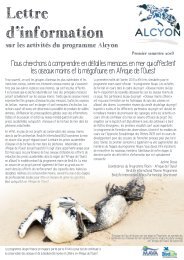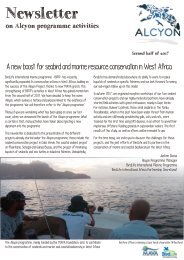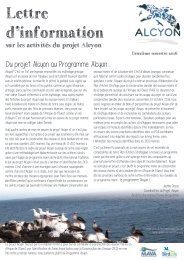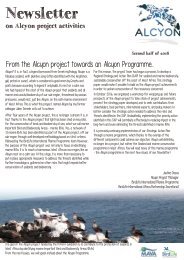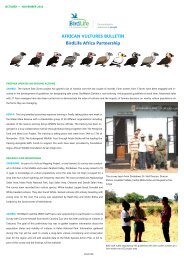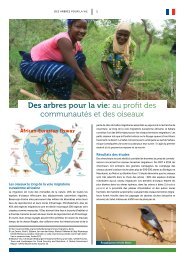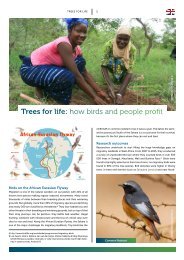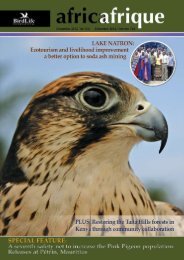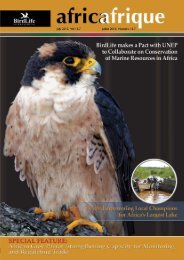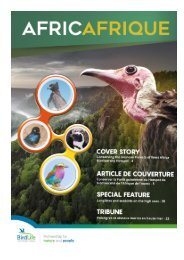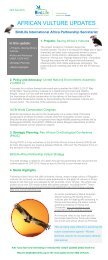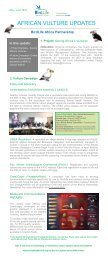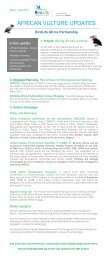ALcyon Newsletter-July 2018-Eng
Create successful ePaper yourself
Turn your PDF publications into a flip-book with our unique Google optimized e-Paper software.
<strong>Newsletter</strong><br />
on Alcyon programme activities<br />
All too often, it is the most sensitive, most vulnerable and less known<br />
group of animals, like those amazing seabirds which associate the least<br />
with the other underwater animals, which are the worst affected.<br />
There is evidence that one of the principal current threats to seabirds<br />
at sea is posed by commercial fisheries. While seabirds are more<br />
threatened than other groups of birds, all species of sea turtles are<br />
endangered and at risk of extinction. West African stakeholders have<br />
now the chance to produce data and to put solid information on the<br />
global agenda and push for action at the international level when speaking<br />
about seabird and turtle bycatch in industrial fisheries.<br />
Indeed, in addition to its land-based seabird conservation projects,<br />
BirdLife International (BLI) is coordinating the implementation of a regional<br />
project to reduce the bycatch of seabirds and sea turtles in industrial<br />
fisheries in West Africa. This is a huge opportunity for BLI and all-level<br />
stakeholders to significantly expand bycatch work in West Africa, using<br />
the proven BirdLife marine programme model. This is also an important<br />
step forward in the battle for capacity building within all disciplines<br />
relevant to marine conservation, paving the way for professional local<br />
team to handle bycatch issues in West Africa.<br />
First half of <strong>2018</strong><br />
We’re digging deep in understanding at-sea threats to seabirds and<br />
marine megafauna in West Africa<br />
The first half of <strong>2018</strong> has been very stimulating for West African<br />
marine programme - the Alcyon programme. The on-going field activities<br />
under the Cape Verde Seabird project are revealing new discoveries<br />
about the seabirds of Cabo Verde. Our local partners working on the<br />
coastal seabird project received training on monitoring techniques using<br />
drones. The first steering committee meeting of the bycatch project<br />
was organised and the very diverse stakeholders and partners of<br />
the project discussed the way to promote good collaboration between<br />
their ongoing activities with a view to contributing to the effective<br />
implementation of the project. Investigations are underway with<br />
fishermen onboard foreigner fleets; the first results are quite worrying.<br />
Observers training programme and EAF courses are in development for<br />
upcoming training sessions on the bycatch project. This first semester<br />
has also seen an increase of the Alcyon programme team. I guess you<br />
cannot wait to meet the new talented members of the team, the last<br />
part of this newsletter is especially dedicated to them.<br />
Justine Dossa<br />
West Africa Marine Programme Coordinator<br />
BirdLife International Marine Programme<br />
BirdLife International Africa Partnership Secretariat<br />
Stranding of northern gannets on a beach in Mauritania, an example of the several<br />
cases of seabirds caught by fishing gears off West Africa (© Oumar Ba)<br />
The Alcyon programme, mainly funded by the MAVA Foundation, aims to contribute<br />
to the conservation of seabirds and marine and coastal biodiversity in West Africa
Minimising bycatch of seabirds<br />
and turtles in industrial fisheries<br />
During this first half of the year, we’ve started up our ambitious<br />
bycatch work for two of the most threatened animal groups in the<br />
world: seabirds and turtles. As you know, we’ve embarked on a multi<br />
partners and collaborative work to reduce seabird and turtle bycatch<br />
in industrial fisheries in West Africa.<br />
In the spring of this year, while most of the project partners have<br />
started up the implementation of their various activities under the<br />
project, we organized the first steering committee meeting (SCM)<br />
of the project. It was exciting to see about 60 representatives<br />
from fishing associations, ministries of fisheries and environment,<br />
universities, research institutes, civil society organizations from the<br />
7 countries (Mauritania, Senegal, Cabo Verde, Gambia, Guinea, Guinea<br />
Bissau and Sierra Leone) of our sub-region together with external<br />
experts sharing and discussing the way to carry on the work<br />
together in order to effectively achieve the goals of the project.<br />
The SCM was a great opportunity to jointly evaluate appropriate<br />
mechanisms to promote communication and dissemination of results<br />
among various partners. The monitoring plan of the project was<br />
developed and adopted with the best evaluation methods to assess<br />
the results against the project specific objectives.<br />
Training tools (modules, manuals and other materials) are under<br />
development for the various training sessions planned in the project:<br />
manuals for professional courses on Ecosystem Approach to Fisheries<br />
(EAF) for fisheries technical staff, fishermen, fisheries managers,<br />
government officials; data collection protocols and tools for observers<br />
training in field skills, as well as basic sea survival, are also being<br />
developed. These training sessions will start in autumn this year.<br />
Investigations are ongoing with industrial fishermen onboard European<br />
fleets, 112 surveys have already been carried out in one of the 7<br />
countries. The first results are quite worrying. You will hear more<br />
shortly.<br />
Reviews of national fisferies and bycatch-related legislations are<br />
underway in the 7 countries by the PRCM in collaboration with<br />
A great cormorant caught in a gillnet reported by fishermen in Joal, Senegal (© D. Thiour)<br />
Participants attending the bycatch project inception workshop (© BirdLife)<br />
UNEP-CMS in order to make recommendations to fill the gaps and to<br />
advocate to improve fisheries governance. .<br />
Colleagues from BirdLife Europe have started an incredible advocacy<br />
process to decrease the impact of EU vessels on seabirds and turtles<br />
in West Africa. Currently research protocols are under development<br />
for 5 MSc and 2 PhD students to build technical expertise within<br />
disciplines relevant to bycatch. This is an amazing step ahead to the<br />
capacity building of technical expertise of West African people under<br />
the project.<br />
Want to know more?<br />
Please contact Ahmed Diame from August1st, at Ahmed.Diame@birdlife.org<br />
Entanglement of a loggerhead in a fishing<br />
gear (© Jordi Chias/uwaterphoto.com)
Conservation of coastal seabirds<br />
along the West African coast<br />
The beginning of the breeding season at Delta du Saloum NP (PNDS)<br />
in Senegal saw a training session on colonial seabird monitoring<br />
combining classic methods with novel monitoring techniques using<br />
drones. Training was provided by external partners (Ecospace/<br />
VEDA Consultancy) and BirdLife staff to experienced officers<br />
from Protected Area agencies and NGOs responsible for seabird<br />
colony monitoring in Guinea-Bissau, Senegal and Mauritania. The<br />
training highlighted the need to use comparable counting methods<br />
in order to assess population numbers and trends across the<br />
region. Participants were briefed on different approaches and<br />
techniques aiming at surveying different seabird species (e.g. royal<br />
tern, grey-headed gull). An introduction on the use and piloting of<br />
drones offered a first insight on how to employ these devices to<br />
monitor colonies and to deal with the challenges of data processing<br />
and analysis. The use of drones is becoming popular worldwide<br />
to support monitoring, research and conservation activities. The<br />
project is working to develop and promote this tool in order to get<br />
accurate and comparable data, while keeping disturbance from<br />
monitoring and research activities to a minimum. A survey of the<br />
seabird colonies of PNDS was also carried out and the results will<br />
be used to assess population trends. Moreover, a threat monitoring<br />
protocol is under development to assess the impact of disturbance<br />
and predation in all the colonies. A study on the geomorphological<br />
dynamic of the coastal zone at key sites is also underway in order<br />
to identify the most vulnerable sites to coastal erosion and natural<br />
hazards.<br />
Promoting the conservation of<br />
Cabo Verde seabirds<br />
The last six months have been very exciting for BirdLife and its<br />
partners under this project (the DNA -National Directorate for the<br />
Environment, the NGOs Biosfera I, Projecto Vitó and SPEA, the BirdLife<br />
partner in Portugal, and the University of Barcelona). Work on the<br />
ground is revealing almost weekly new findings about the seabirds of<br />
Cabo Verde.<br />
Training Protected Areas officers on the use of drones in Parc National du<br />
Delta du Saloum (©BirdLife)<br />
Training nest counting in high-density seabird colonies in Parc National du<br />
Delta du Saloum (© BirdLife)<br />
Want to know more?<br />
Please contact Miguel Lecoq at Miguel.Lecoq@birdlife.org.<br />
Many unknown sites with breeding Cape Verde petrel, red-billed<br />
tropicbird, band-rumped storm-petrel, Cape Verde and Audubon’s<br />
Shearwaters and brown booby colonies were located during recent<br />
systematic surveys. A black-capped petrel showing a brood patch,<br />
an endangered species found to breed only at a single island in the<br />
Caribbean, was caught in suitable habitat suggesting breeding may<br />
occur. Studies on the breeding and foraging ecology of the seabird<br />
species breeding in the archipelago are ongoing at a number of key<br />
sites.<br />
Seabird surveys in Santo Antão (© Vitor Paiva)
Field data are being collected mostly by local PhD and Masters<br />
students together with highly motivated field assistants. For the<br />
first time breeding white-faced storm-petrels at Ilhéu da Laje<br />
Branca are being closely monitored using purpose-built artificial nests<br />
in collaboration with a local NGO (Fundação Maio Biodiversidade).<br />
Continuous monitoring of red-billed tropicbird and Cape Verde petrel<br />
colonies is showing unsustainable levels of predation by dogs and<br />
cats, as well as illegal trapping by people at key sites. These data<br />
are essential to assess threat impact in order to implement urgent<br />
conservation action. An ambitious national awareness and educational<br />
campaign on the conservation of the seabirds of the archipelago<br />
is receiving a massive participation from schoolchildren. A cartoon<br />
featuring a couple of Cape Verde shearwaters has already been<br />
broadcast on television receiving wide acknowledgement. Regular radio<br />
shows on the national public broadcasting station are also contributing<br />
to put the Cape Verdean seabirds on the map.<br />
Raising awareness for the conservation of the Cabo Verde seabirds at<br />
Mindelo (© Biosfera 1)<br />
Alcyon Programme staff Updates<br />
. During this first half of the year, a huge part of our time was spent in recruitment process. The Alcyon team grew up with 5 talented<br />
new colleagues.<br />
Ngoné Diop (seabirds.intern@birdlife.org) has joined us in May <strong>2018</strong> as Intern, to support the seabird projects<br />
Mame Betty Lette Diouf (betty.diouf@birdlife.org) has joined us in June <strong>2018</strong> as Programme Assistant<br />
Ahmed Diame (ahmed.diame@birdlife.org) will be joining us on 1st August <strong>2018</strong> as the bycatch Project Manager.<br />
Ruben Rocha (ruben.rocha@birdlife.org) has joined us on 1st June <strong>2018</strong> as the bycatch Instructor to support seabird bycatch<br />
data collection<br />
Oumar Ba (bycatch.intern@birdlife.org) has joined us on 1st June <strong>2018</strong> as the bycatch Intern in a perspective to take the role of<br />
bycatch Instructor, focussing on turtles data collection.<br />
Upcoming events<br />
23-24 <strong>July</strong> <strong>2018</strong>, Abidjan Côte d’Ivoire, 1st Aquatic Wildlife Partnership meeting<br />
6-16 August <strong>2018</strong>, monitoring campaign of marine avifauna and megafauna in the continental shelf and slope of Mauritanian waters on<br />
board the N / O Al Awam. BirdLife will participate in the campaign and will contribute to practical training for IMROP technical team on<br />
avifauna survey during the campaign.<br />
Call for Students: BirdLife is looking for motivated and capable students, with a keen interest in both fisheries and seabirds, for MSc and<br />
PhD programme. Funding for research costs is available for both MSc and PhD. Announcements can be found on the BirdLife website.<br />
For more information :<br />
Justine Dossa<br />
West Africa Marine Programme Coordinator<br />
Justine.Dossa@birdlife.org<br />
www.birdlife.org



